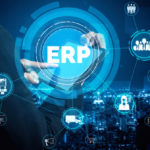Enterprise Resource Planning (ERP)
ERP has the ability to provide a comprehensive suite of business software. ERP software and implementation, all share a common statistical prototype and operations that cover broad operational processes from accounting to formulation and service.
Companies use enterprise resource planning (ERP), a procedure that assists in managing and integrating important business purposes. Businesses and firms have more than one or multiple ERP system applications that help them to implement asset drafting. They merge all the required processes and procedures to run their business with one software. ERP system software can join forethought, acquiring sales and listings, marketing and finance, HR, and other tasks.
The Business Worth of ERP
Investing in IT software applications which merges every aspect of work is one of the finest ways to generate value. Enterprise Resource Planning (ERP) software can transform disorganized firms into market leaders, providing value to customers, employees, and owners.
Enterprise Resource Planning can be described as a collection of software which range from cloud ERP for small businesses, warehouse solution management. It can be used to unify all divisions and ensure that they work simultaneously. This will allow firms to increase their efficiency and add value.
Brief Background of ERP
ERP solutions have been around for more than 100 years. Ford Whitman Harris, a computer scientist, developed the ‘Economic Quantity’ (EOQ) model. This paper-based fabrication system enabled the production schedule in 1913. For decades, EOQ has been the industry standard in production. Toolmaker Black and Decker, in 1964, was the first to implement a material requirement planning solution (MRP), which combined EOQ concepts and a mainframe system.
MRP was the model standard until 1983, when manufacturing resource planning (called MRP II) was introduced. It also included segments, a crucial component of the software architecture. They combined core modeling components like buying, scheduling, billing and contract management. At the beginning, different inventing tasks were integrated into one system. As computer technology improved from the 1970s to the 1980s, concepts similar to MRP II began to emerge. They were created to run business activities beyond assembly. This new type of business management software was named enterprise resource planning by technology analysts in 1990.
SAP Analytics for Cloud — a new ERP delivery feature
The SAP Analytics Cloud solution combines BI and augmented analytics with planning capabilities in one cloud environment. It is the analytics layer within SAP’s Business Technology Platform and supports enterprise-wide advanced analytics.
An end-to-end solution for analytics can meet the needs of any type of person or decision.
With intuitive self-service analytics and business intelligence features, you can explore data throughout the organization to provide insights at the decision point.
To make better decisions, integrate financial and operational planning into one system.
Our augmented analytics capabilities enable you to go the extra mile in data-driven decision-making with machine-generated insights and analytics.
Better business decisions with HCC Cloud ERP Solutions
Traditional ERP’s complexity and high cost have been a problem for organizations. They also struggle to find the right balance between the needs of their business and the desire for custom features and flexibility. Learn how Oracle ERP Cloud provides connected teams, unified information, and real-time insight to help you and the finance team make the right business decisions. Your organization can stay ahead of the curve with ERP as a cloud-based service.
How effective is ERP in Modern Day Business Scenario
According to a report by Oracle, ERP software systems have a significant impact on many industries. The worldwide market for ERP software is expected to reach $50 Billion by 2021. ERP can help you find the right tools to keep your business competitive.
Benefits
Organizations who want to manage their business functions in a centralized and integrated system can use enterprise resource planning (ERP). Companies working in the e-commerce and supply chain often use ERP to keep track of every step of manufacturing and distribution. ERP can also be used by many industries, including healthcare, non-profit groups, construction, hospitality, and construction. ERP can be used by organizations that need to manage staff, customers, inventory, and other business functions.
ERP stores all data entered into one database. This allows all departments to access the same data. All this data can be organized and analyzed to create reports. ERP combines customer management, financial management, human resources, supply chain capabilities, inventory management, and business intelligence into one system.
Adoption Rate
- The Asia Pacific market in Enterprise Resource Planning (ERP) software has exploded to $10 billion by 2020 and is expected to grow to $26.37 billion by 2026.
- The global Enterprise Resource Planning (ERP) market was worth $76.8 billion in 2018. It is projected to grow 8.2% to $105.26 billion by 2022.
- 53% of businesses have Enterprise Resource Planning (ERP) or Customer Relationship Management (CRM) as their precedence investments.
- Mid-sized businesses, as well as startups, will adopt Enterprise Resource Planning (ERP) applications starting in 2020 at an 8.27% CAGR.
- The Aerospace and Defense Industries have the highest Enterprise Resource Planning (ERP) utilization rate at 7.1% by 2020, with a total of $4B in maintenance, licensing, and subscription returns.
- Enterprise Resource Planning (ERP) is growing in popularity every day. ERP is essential for any business to secure a bright future. There are many ERP software choices on the market.
Conclusion
Startups or Organizations should not be thinking about which vendor to go for, big or small when it comes to ERP solutions. They should be focused on the integrations of ERP software with their systems or applications. The support for ERP is growing day by and will continue to do so. ERP is the solution for quick automation from Human resources to Accounting tasks. Contact HCC for your ERP Needs.

